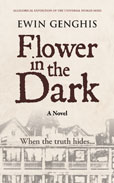
 |
Probing into the deepest recesses of the mind uncovers the utter monstrosities that are in an ever-present tug of war with human goodness, virtue, and morality. This madness is on full display through the lens of protagonist Alyssa Brown, a newly minted psychologist. Genghis uses the trio of philosophy, religion, and psychology to explore the depths of the human mind. What ensues is a thrilling and thought-provoking masterpiece, a commentary on what it means to know the dark side of humanity and still live with hope.
Interestingly, it doesn't take long for the interactions between characters to come alive in their wildest forms. In fact, it is almost as if Genghis himself is a fly on the wall of the cerebrum, capturing every thought, no matter how sinister or crude. This is best evidenced by one of the novel's first scenes in which Alyssa finds herself at the gym fawning over Mark Stanford, a modern-day Adonis and the embodiment of masculine perfection. As she daydreams of what she could do to him, her thoughts flutter to her boyfriend, Cy, an aspiring writer. Throughout the scene, as with the novel as a whole, sexuality is a dominant theme. However, Alyssa's processing of it and the events that happen around her undoubtedly steal the show. Moreover, the author's ability to juxtapose metaphorical discussions with tangible objects like the gym clock that Alyssa perceives to have stopped adds a layer of surrealism that is a unique fusion of Inception meets Salvador Dali's The Persistence of Memory.
Members of the Donald Clinic, psychologists and psychiatrists alike, share an aura of transparency that provides audiences with a human glimpse behind the hardened, neutral expressions of therapists. Perhaps none do this better than Jocelyn Goronowski, a psychiatrist who seems to have the uncanny ability to read Alyssa flawlessly. Despite having Alyssa achieve her career aspirations of being a psychologist, Genghis pulls no punches in establishing the troubled nature of her existence and her inability to remove herself from her past, especially as it pertains to her family dynamic with her deceased parents. In fact, in Alyssa's counseling sessions with both millionaire lawyer Gilbert Rockport and Benjamin Clayton, the audience is clearly able to see signs of countertransference, where Alyssa's own experiences are being imprinted as her clients' feelings. It is with these clients that Alyssa can unpack complex topics such as the linkage between sex and aggression as well as the Oedipus complex. Without question, the segments on Benjamin Clayton's book rattle Alyssa and have her making connections to her own siblings and father.
From a stylistic perspective, Genghis' command of language and ability to evoke emotion from a reader is unparalleled. Whether it is the image of Alyssa looking up at the image of Christ the Redeemer in the stained glass window behind the altar or the graphic portrayal of Rockport's House of Fantasy BDSM excursions, the author repeatedly demonstrates his understanding of human behavior. Digging deeper, the text touches on the contributions of noteworthy psychoanalysts like Lacan, Kohut's analysis on the view of self, and even Ogden's "Third Object" in a manner that not only creates a sense of relatability with the reader but one that also provides compelling educational insight, all while never relinquishing the reins to a riveting story.
Throughout the book, Alyssa asks scintillating questions like, "Did God send you here?", "Is religious belief a disease?", and "Is love really the most important part of being human?" These questions are not limited to the circumstances of the novel but are essentially the author's way of removing blinders from reality and helping readers better understand themselves. Alyssa represents every man and woman, fundamentally flawed and complex beings with equal parts of naivete and deception, in whose shadows the truth is conveniently tucked away. For Alyssa's character alone, this book is a must-read. Genghis' combination of witty dialogue and well-researched interjections deliver a piece unlike any other: raw, authentic, and mind-numbingly vulnerable.
RECOMMENDED by the US Review